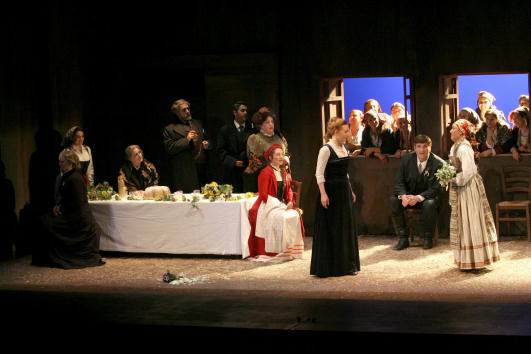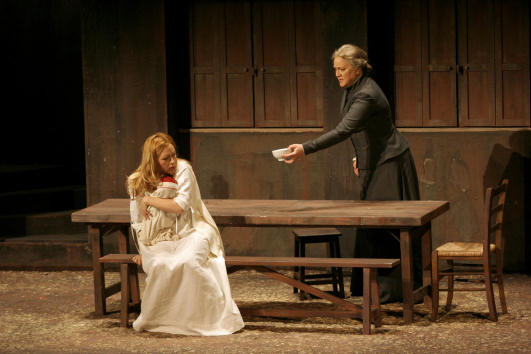Other Links
Editorial Board
-
Editor - Bill Kenny
-
Deputy Editor - Bob Briggs
Founder - Len Mullenger
Google Site Search
SEEN AND HEARD
INTERNATIONAL OPERA REVIEW
Janáček,
Jenufa :
Production from Angers
Nantes Opéra, Patrice Caurier and Moshe Leiser stage directors. Soloists,
chorus. ballet and orchestra of the Opéra de Marseille, Mark Shanahan conductor.
Marseille, France. 7. 4.2009 (MM)
The south of France has had the rare gift of three different productions of Janáček's

The Marseille installment from the Opéra de Nantes arrived with portfolio, as it
had earned the 2007 Prix Claude Rostand, given by France's syndicate of
professional music and theater critics for the best provincial opera
production. Janáček's
From the House of the Dead at the Aix Festival had won the syndicate's
The Nantes production arrived somewhat intact, most importantly with its original directors. That the directorial team Moshe Leiser and Patrice Caurier are among the world's finest opera directors is without question, as these men bring a distilled vision, directorial detail, and unfailing musicality to their stagings. These rarefied attributes can be dangerous though, since perfection is often stifling in its carefulness, and near perfection is equally off-putting. What stifled in Marseille however, were the occasions when when their theatrical process was not musically transformed, their careful directorial vision being overrun by sheer musical mass.
The Nantes production also brought along its conductor Mark Shanahan who imposed a larger musical sweep to Janáček's masterwork at the expense of its essential musical detail - my prize for detail goes to the Toulon conductor Friedrich Pleyer and my prize for getting it all just right goes to Canadian conductor Jaques [sic] Lacombe in Monte Carlo.
Leiser and Carrier work in small details. The stage, an ominous limited dark space, had only a small pool of real water for the mill pond, a basket of potatoes and a pile of firewood that foretold the coming winter; the essentials of rural life. Against this the actors emerged in huge relief, every gesture calculated, with emotive accents effected by faces and figures brought into perspective by subtle directional light. The ugly knife slash was effected in a brutal struggle of minimal movement.

Also from the original Nantes production was the Jenufa, Russian soprano Olga
Guryakova, who proved herself again an extraordinary singing actress, her simple
country girl Jenufa in blatant contrast to her elegant, aristocratic Liza in
Lyon's Pique Dame last season. Mme. Guryakova appears young and her dark
and warm voice is in the prime of its life. She made glorious work of Jenufa's
fortissimo high C's in the climactic denouement, and revelled in
her ability to mold the stratospheric moments of Jenufa's prayer to the Virgin
at mezza voce.
New to the production however, was the hulking Laca of American tenor Hugh
Smith, possessing a large, supple voice capable of subtle gradations of mood, an
actor able to turn delicate stage directions into the infinity of emotional
realities within this complex role. In the final moments of the opera his face
slowly changed from uncertainty to ecstasy as powerful white light filled the
stage and he achieved Jenufa's love at last.
The second act played in front of a blank brown wall with only three small
shuttered windows and a door to admit harsh, mid-winter nature.
New as well to the production was the Kostelnicka of Nadine Secunde, seen in this same role in Toulon where she had portrayed a woman of rigidity, blind stupidity and basic dignity. In this Marseille production she attained strange stature, certainly neither tragic nor heroic, but unbearably human, a simple woman forced to defend the values of her world and its progeny in unspeakable ways. Her anger in the first act had turned into instinctive raison d'état conclusions in the second act, with action that unfolded in carefully delineated moments. Her third act confession was hurled forth in the frayed voice of a woman whose miniscule universe had collapsed. Mme. Secunde's performance was a tour de force of direction, singing and acting.
Of special note too was American mezzo soprano Sheila Nadler, also from the Nantes production, as Grandmother Buryja. Mme. Nadler, who has had a long, distinguished career, was in remarkably fine voice for this enigmatic character role that so complicates the history of the Buryjovka family.
Though most often a protagonist in Jenufa, the chorus was given a subordinate role and its place here was almost incidental to the focused personal dramas. Steva too became a subordinate role, tenor Jesus Garcia too small of stature and voice to impress himself into the guts of the production. Among the supporting cast, many of whom also came with the production, only Starek, the mill foreman, impressively performed by Patrice Berger, found a larger presence in the action of this production.
Janáček's musical world churns every thought, noble and vicious and every gradation between, in constant musical motives that are obsessive when not hysterical. Mo. Shanahan subordinated this effervescent continuum into a larger symphonic wash that surrounded the actors, seemingly independent of them. Finding this unexpected larger perspective in Janáček's score, and insisting on it, Mo. Shanahan diminished the musical and human force of Janáček's - and Messieurs Leiser and Carrier's- carefully drawn characters.
Make no mistake, this was a superb, thoughtful production with committed, if strained musical values. Certainly a prize winner.
Michael Milenski
Pictures © Christian Dresse
Back to Top Cumulative Index Page
